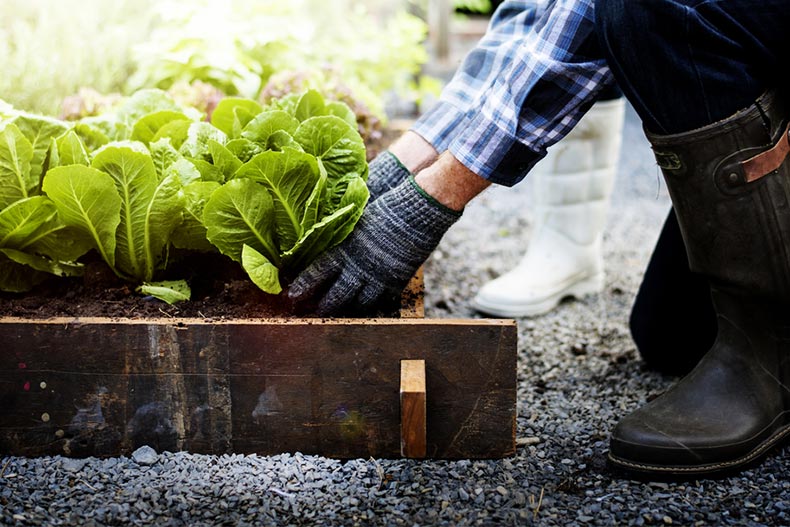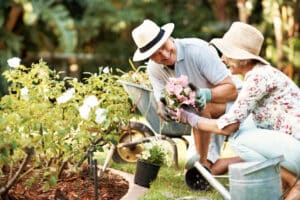There’s something magical about stepping out into the sunlight and breathing in the scent of earth and possibility. For many retirees, gardening is more than just a pastime—it’s a source of joy, wellness, purpose, and connection. Whether you picture a lush vegetable patch, a riot of colorful blooms, or a simple container garden on the patio, gardening invites you to get your hands a little dirty and watch life unfold before your eyes.
Let’s explore why gardening feels so good and why everyone seems to recommend it!
Gardening Brings Health and Happiness
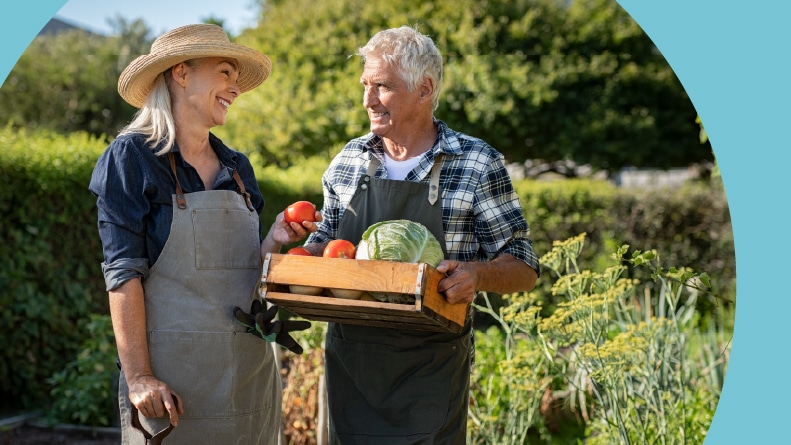
Gardening is a gentle form of physical activity. Bending, planting, watering, and even harvesting all get your body moving without the intensity of a gym workout. You’re stretching muscles, working on balance and coordination, and spending time in the fresh air—all of which support a healthier lifestyle.
Also, spending an hour or so outside can be refreshing and restorative. The sunshine gives your body a boost of Vitamin D, which is essential for healthy bones and immune function.
But the benefits go beyond the physical. Spending time in nature and caring for plants can lower stress and anxiety, reduce tension, and promote a sense of calm. Gardens become spaces where your mind can slow down, focus on the present moment, and soak in the peaceful rhythms of growth. Many retirees find that the simple act of nurturing life fosters purpose and satisfaction.
A Sense of Purpose and Routine
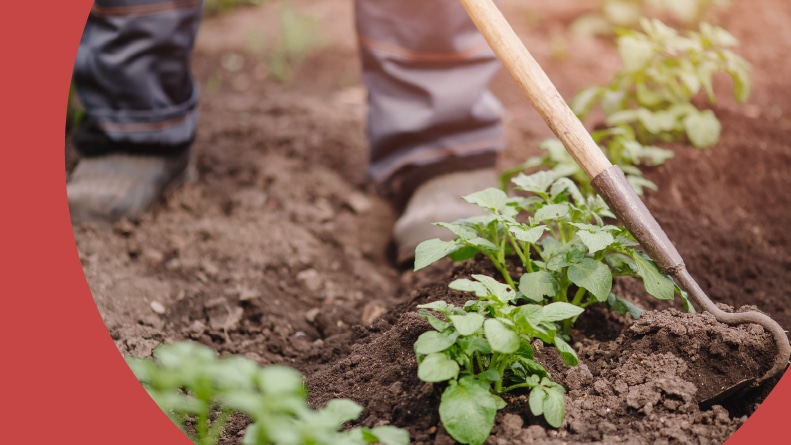
Retirement can feel like a major life shift. Suddenly, your calendar is wide open. You might be looking for something meaningful to fill your time. Gardening naturally lends itself to structure and rhythm. There’s always something to do each season—ordering seeds in winter, planting in spring, weeding in summer, harvesting in fall, planning for next year in winter. This cadence gives your weeks and months shape and purpose.
For many active adults, that sense of purpose is a powerful anchor. It keeps them engaged and gives them something to look forward to every day. Watching a plant grow from a tiny seed into a thriving crop or fragrant bloom is one of those simple pleasures that feeds the soul.
Boosting Your Social Circle Through Gardening
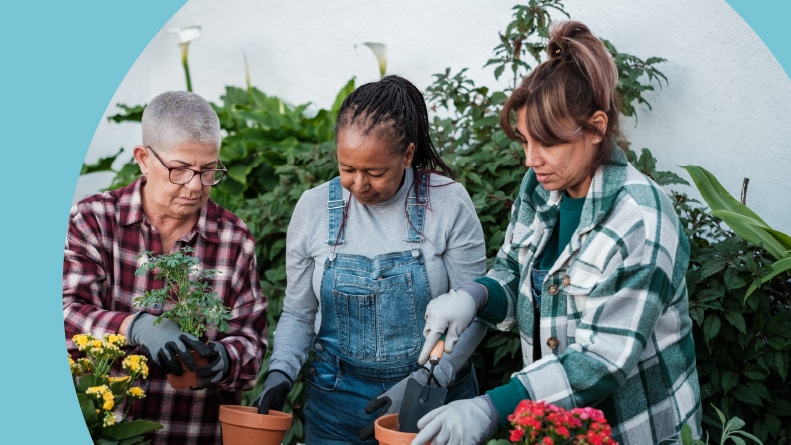
Gardening doesn’t have to be a solo pursuit (though some days, solitude in your garden can be blissful). Many 55+ communities and neighborhoods host community gardens, garden clubs, and plant swaps where people come together to share tips, seeds, and stories. These shared experiences are great ways to meet like-minded folks, build friendships, and be part of a fun social circle.
Even if your garden is at home, neighbors often stop by to chat about what you’re growing, share cuttings, or swap recipes using your produce. Across the country, gardening serves as a natural way to connect hearts and hands in the sunshine.
A Garden That Grows With You
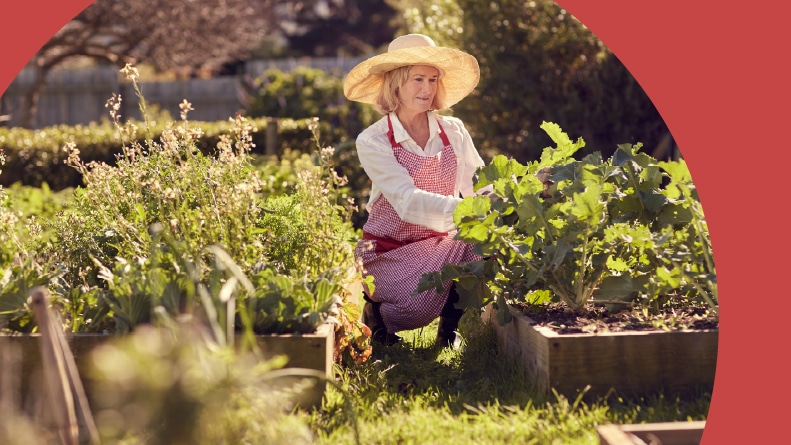
One of the best things about gardening is that it’s totally adaptable. You don’t need a sprawling backyard to make it work. Patio containers, window boxes, raised beds, and vertical gardens all give you ways to grow without heavy lifting or space constraints. Ergonomic gardening tools and raised garden beds make planting easier on your joints and back. This is especially useful if bending and kneeling are challenging.
For some active adults 55+, even small pots of herbs on a balcony or a sunny windowsill create a connection to the natural world right where they live. There’s no right or wrong way to design your garden—just what feels good for you.
Garden Fresh: Delicious and Nutritious
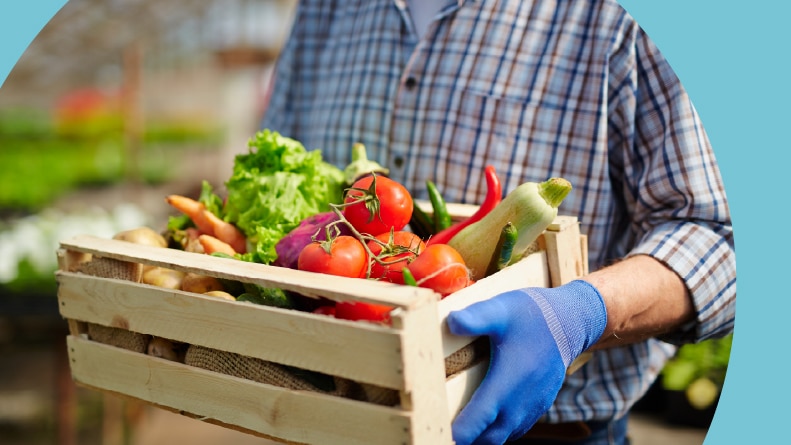
There’s something special about biting into a tomato you’ve grown yourself or brushing mint from your own herb garden into a summer salad. Growing your own vegetables, herbs, and fruits encourages you to eat fresher, more nutritious foods. It’s a little like having your own seasonal farmers market right outside your door.
Plus, sharing your harvest with family and friends spreads the joy even further. Gardening doesn’t just feed your body; it feeds your relationships and creates memories around food and fellowship.
How to Begin: Simple Steps to Get Growing
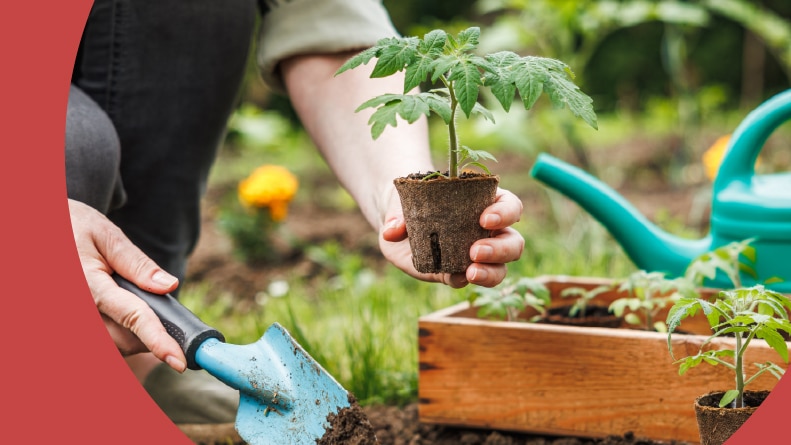
Starting a garden doesn’t have to be intimidating. In fact, the key is to start small and build confidence step by step. Here are some friendly tips to help you begin:
- Find the Right Spot: Pick a place that gets plenty of sunlight. Most vegetables and flowers thrive with at least six hours of daily light. Even a small corner of your yard or a sunny patio can be perfect.
- Choose Easy Plants First: Herbs such as basil, parsley, and mint are forgiving and quick to grow, making them perfect for beginners. Leafy greens, cherry tomatoes, and marigolds are also great starter plants that reward you quickly.
- Consider Accessibility: Raised beds or container gardens can reduce strain on your back and knees. Lightweight, ergonomic gardening tools and a comfy garden stool make the experience more comfortable and enjoyable.
- Water Wisely: Keep an eye on moisture. Plants need consistent watering, especially in hot weather. Early mornings or evenings are ideal times to water without losing too much to evaporation.
- Enjoy the Process: Gardening isn’t about perfection. It’s about learning, experimenting, laughing at little failures, and celebrating the triumphs, whether that’s the first sprout or an abundant harvest.
FAQ: Gardening as a Retirement Hobby
Why is gardening such a popular hobby in retirement?
Gardening blends light physical activity, fresh air, creativity, and daily purpose, making it a rewarding way to stay active and engaged.
What are the health benefits of gardening for seniors?
Gardening supports balance, flexibility, and coordination, provides Vitamin D from sunlight, and can reduce stress and anxiety.
Is gardening good exercise for older adults?
Yes, gardening is a gentle form of physical activity that keeps the body moving without the strain of high-impact workouts. It supports flexibility, balance, coordination, and light strength-building, while allowing you to move at your own pace.
Can gardening help with stress, anxiety, or mood in retirement?
Absolutely. Caring for plants and spending time outdoors can lower stress levels and reduce anxiety. Many retirees find that tending a garden creates a peaceful rhythm that improves overall mood and emotional well-being.
What are the best beginner plants for retirees to grow?
Herbs such as basil, parsley, and mint are excellent starter plants because they’re forgiving and grow quickly. Leafy greens, cherry tomatoes, and marigolds are also beginner-friendly options that provide satisfying, visible results early on.
What’s the easiest type of garden to start—raised beds, containers, or in-ground?
Container gardens and raised beds are often the easiest options, especially for retirees. They require less bending and can be placed in convenient, sunny spots. Raised beds, in particular, make gardening more accessible and easier on the joints.
How do I start a small garden if I don’t have a yard?
You don’t need a large backyard to garden. Patio containers, balcony planters, window boxes, and even a few pots of herbs on a sunny windowsill can create a meaningful gardening experience.
What are the best low-maintenance gardening ideas for retirees?
Starting small is key. Choose easy plants, group them in containers or raised beds, and focus on manageable sections rather than large plots. Herbs and hardy vegetables require less maintenance, and watering in the early morning or evening simplifies upkeep.
How can I garden with knee, back, or joint pain?
Raised beds and container gardens significantly reduce strain on the knees and back. Using ergonomic tools and working in shorter sessions can also help. The goal is to adapt the garden to your comfort level so you can continue enjoying it safely.
How much sun do most plants need, and what can I grow in shade?
Most vegetables and flowering plants thrive with at least six hours of sunlight per day. If your space has limited sun, consider growing herbs or plants suited to partial shade.
How often should I water my garden, especially in hot weather?
Plants need consistent moisture, especially during warm months. Early mornings or evenings are the best times to water, as they reduce evaporation and allow plants to absorb moisture more effectively.
How can gardening help retirees meet new people and make friends?
Gardening often becomes a natural social bridge. Many neighborhoods and 55+ communities offer garden clubs, plant swaps, and community garden spaces where residents can share tips and stories. Even home gardeners frequently connect with neighbors over shared harvests and conversations about what’s growing.
Do 55+ communities offer garden clubs or community gardens for residents?
Many 55+ communities include shared greenspaces, community gardens, and resident-led garden clubs. These amenities create built-in opportunities for social interaction while giving residents dedicated spaces to grow flowers, vegetables, and friendships alike.
Growing a Garden and a Life You Love
Gardening blends creativity, movement, fresh air, and purpose in a way few activities do. It invites you to be present, to nurture, and to enjoy the fruits of your labor in more ways than one. For active adults 55+, gardening supports physical wellness, mental clarity, connection, and joy.
So grab a shovel, pick out some seeds, and let your garden be a place where your heart blooms as beautifully as your plants. There’s no better time than now to begin.
Want to find amazing 55+ communities with plenty of greenspace to grow and thrive? Reach out to the team at 55places to learn more!


